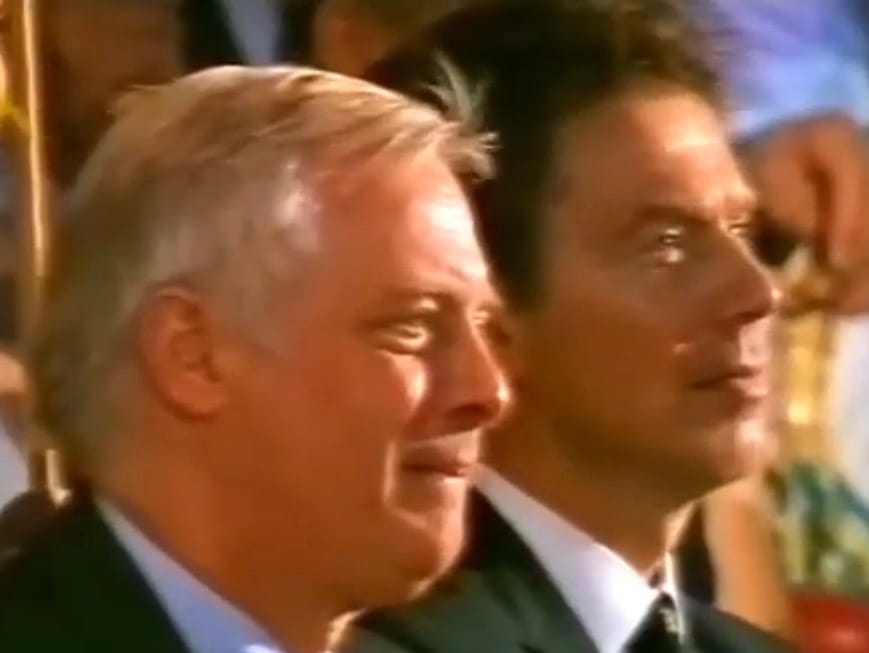THE HANDOVER

With a clenched-jaw nod from the Prince of Wales, a last rendition of God Save the Queen, and a wind machine to keep the Union flag flying for a final 16 minutes of indoor pomp, Britain last night at midnight shut down the empire that once encompassed a quarter of the globe. Nearly five centuries after Vasco de Gama launched an era of European empire building in Asia, and 50 years after Britain put the process in reverse with independence in India, it took only a quarter of an hour of martial pomp and minutely scripted ceremony to end 156 years of British colonial rule in Hong Kong. The transfer, completed in a glass-encased hall overlooking the harbour that first attracted the covetous eye of British opium traffickers, climaxed a day of rain and tear-soaked British pageantry, Sino-British summitry and carefully calibrated discourtesies.
Working on a small script project recently got me thinking about the British handover of Hong Kong to China. I decided to revisit a few clips from that day—1st July 1997—and found one showing Chris Patten and Tony Blair sitting next to each other while an orchestra plays Elgar’s Nimrod in a rainy Victoria Harbour during the British Departure Ceremony. I couldn’t help but feel—perhaps a writer’s projection—that I was observing a perfect distillation of two opposing sentiments from that moment in history: one still rooted in Britain’s past, and the other in its future.
Patten, though certainly no blinded champion of Britain’s imperial legacy in Hong Kong, felt a strong sense of responsibility toward the region and its future—particularly regarding the protection of the rule of law, civil liberties, and democratic governance. Blair, on the other hand—only recently appointed Prime Minister—was far more pragmatic and forward-thinking about the new global order and post-Empire alignments. He seemed to believe that Britain would continue to play a modernising role in the world through diplomacy and trade (this was before 9/11 sent the West into an accelerated tailspin, and before the madness of his disastrous wars in Afghanistan and Iraq).
It was certainly a day that held far more symbolic significance for Britain than it did for Hong Kong—a significance that may be shifting now, given the increasing control exerted by the CCP, especially with the imposition of the national security law, which has led many Hongkongers to emigrate to Britain. And yet, with the UK lately jumping the shark so spectacularly by leaning into its own progressive authoritarianism (a cultural revolution by any other name), it’s poignant to look back at the final curtain being drawn on the last vestiges of British empire—for both Britain and Hong Kong—two cultures that shared a long, complex history, and often, one of mutual respect.
Elgar’s Nimrod was, of course, the perfect soundtrack to such an occasion, evoking that noble, wistful melancholy of nostalgia disguised as stiff-upper-lip stoicism. I find it interesting to note that Patten, upon hearing the opening notes, immediately bows his head, as if he understands what the music symbolises, while the steely-eyed Blair remains seemingly unmoved—already prepared to step forth into a new phase of globalisation, one that values culture less and embraces a kind of civilisational correction through a one-size-fits-all model of top-down centralised politics. In this sense, he was far more aligned with the Chinese leaders regaining control of Hong Kong than Patten—who could have had little idea of the generational damage the technocrat standing beside him would later inflict on the UK and the wider world, far more than the relatively benign influence of Britain’s role in Hong Kong throughout the post-WWII era.
At dawn today, China stamped its authority on its new possession, when 4,000 troops backed by armoured cars and helicopters crossed into the territory. But the army, struggling to shake off the stigma of the Tiananmen Square massacre, projected a softer image, with many troops wearing ties and white gloves rather than combat gear.
"We shall not forget you, and we shall watch with the closest interest as you embark on this new era of your remarkable history," promised Prince Charles.
Less than an hour into Chinese rule, as the royal yacht Britannia slipped its moorings, carrying Prince Charles and the 28th and last British governor, Chris Patten, out of Victoria Harbour at the head of a flotilla of British ships bound for Manila, pro-democracy politicians gathered on the balcony of the Legislative Council to protest at China's abolition of Hong Kong's elected assembly.
Throughout the day Britain stressed its own contribution to Hong Kong's prosperity while China barely acknowledged Britain's presence. "This is a Chinese city, a very Chinese city with British characteristics," said Mr Patten, at a British farewell festival, held next to the Prince of Wales Barracks, now stripped of its name and full of Chinese soldiers. Radio frequencies used by British Armed Forces Radio now only crackle with static.
Chinese leaders arrived by air too late to attend a rain-drenched British farewell festival at sunset and then skipped a British banquet. But in a small but unexpected gesture, Mr Jiang shook the hand of Mr Patten, vilified by Beijing as a "sinner for a thousand generations" because of the modest political reforms he introduced.
A last hurrah and an empire closes down. China again master of Hong Kong. - The Guardian report on 1 July 1997 by Andrew Higgins.